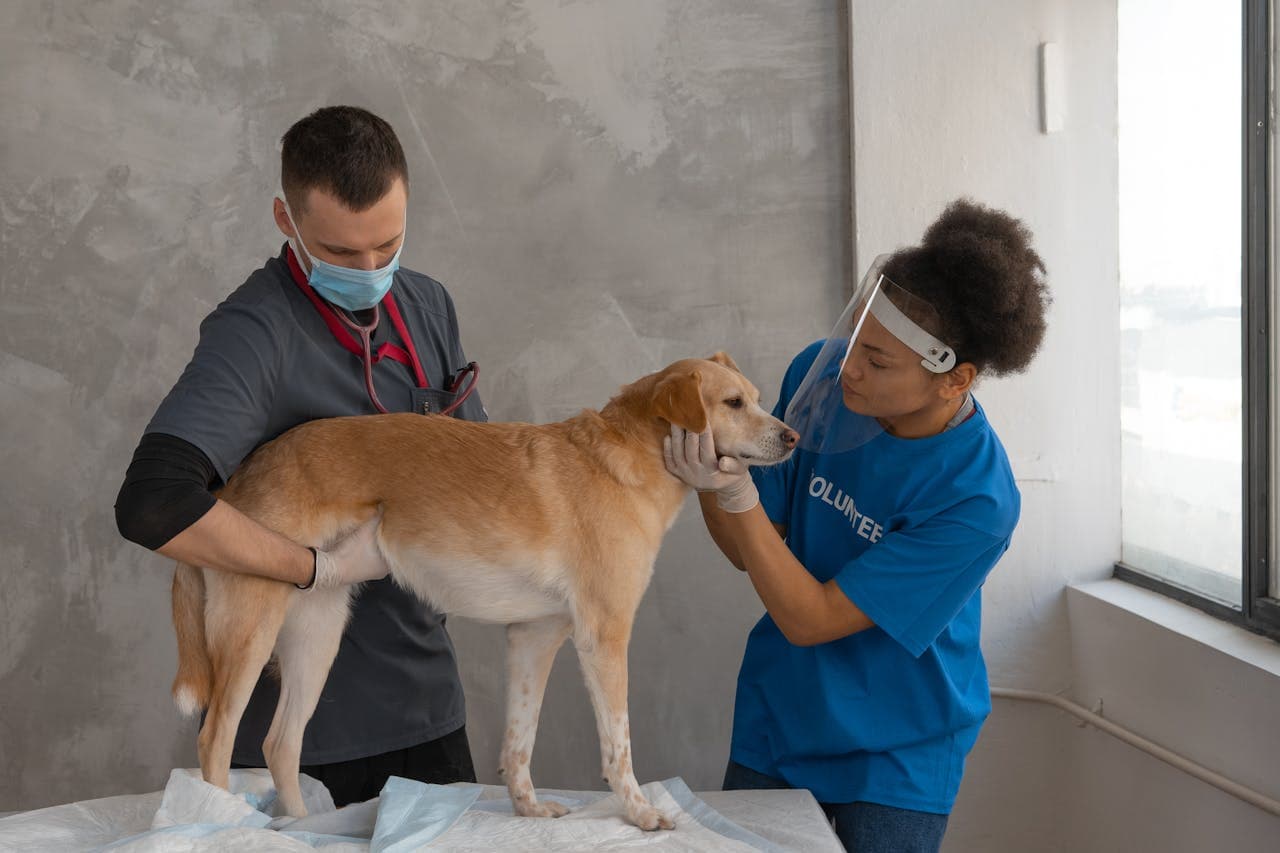
Acute Gastroenteritis (Stomach Flu)

Our guide has been authored by qualified veterinarians, but should not be taken as substitute for medical advice or professional veterinary consultation. If your pet displays any unusual symptoms, we strongly advise seeking guidance from a veterinarian
Understanding Acute Gastroenteritis (Stomach Flu) in dogs
Acute Gastroenteritis is a sudden disruption in the digestive system’s normal function. It’s usually caused by viruses, bacteria, or parasites that enter the digestive system via contaminated external sources or due to natural causes. Acute Gastroenteritis typically lasts a few days, causing discomfort for the dog and their owner, and typically doesn’t require more than supportive care. However, in some cases, it can lead to dehydration or severe illness, requiring hospitalization.
Acute Gastroenteritis (Stomach Flu)'s Causes: Uncovering Triggers
Dietary indiscretion: Dogs are notorious for eating things they shouldn’t, such as spoiled food, garbage, or non-food items, leading to gastrointestinal upset.
Infectious agents:
- Bacterial infections: Common culprits include Salmonella, Campylobacter, and Escherichia coli.
- Viral infections: Canine parvovirus, canine coronavirus, and canine distemper virus can cause acute gastroenteritis.
- Parasitic infections: Intestinal parasites like roundworms, hookworms, and giardia can lead to acute gastroenteritis.
Food allergies or intolerances: Sudden reactions to a new food or ingredient can trigger gastroenteritis.
Toxins: Ingestion of toxic substances such as certain plants, chemicals, or medications can cause acute gastroenteritis.
Medications: Some drugs, like non-steroidal anti-inflammatory drugs (NSAIDs) or certain antibiotics, can irritate the stomach and intestines, leading to inflammation.
Stress or anxiety: Stressful events, such as boarding, traveling, or changes in the home environment can contribute to acute gastrointestinal upset.
Sudden dietary changes: Rapid changes in diet, especially without a transition period, can upset a dog’s digestive system.
 Recognizing Acute Gastroenteritis (Stomach Flu): Signs and Symptoms
Recognizing Acute Gastroenteritis (Stomach Flu): Signs and Symptoms
- Frequent, acute diarrhea: This is the most common symptom. The dog may need to go outside frequently or have “accidents” indoors. The diarrhea can be brown or yellowish, with a liquid texture, and sometimes oily droplets or traces of blood caused by irritation in the colon and rectum.
- Vomiting: Often occurs alongside diarrhea or alone. The vomit may be clear, yellow, or brown, often accompanied by abdominal contractions indicating effort.
- Stomach pain, gas, and cramping
In most cases, the dog will appear fine, aside from the symptoms mentioned above. Severe cases of inflammation or dehydration may include decreased appetite, depression, and lack of vitality.
 Acute Gastroenteritis (Stomach Flu) Diagnosis: How it's Identified
Acute Gastroenteritis (Stomach Flu) Diagnosis: How it's Identified
- Most cases are diagnosed based on clinical signs alone. Most cases of acute gastroenteritis will be resolved without treatment outside of supportive care, especially if signs only include diarrhea and the dog seems otherwise healthy and active. However, if additional symptoms such as ongoing vomiting, bloody stools, loss of appetite, or lethargy appear, it’s essential to contact your veterinarian as soon as possible to prevent a more severe condition or dehydration.
- Physical examination at the clinic includes taking vital signs, an abdominal examination, and a rectal examination.
- If diarrhea lasts more than a day or two, a stool test checks the presence of parasites or bacteria.
- While blood tests and imaging usually don’t show significant signs of acute gastroenteritis, they can help rule out more serious issues.
 Treating Acute Gastroenteritis (Stomach Flu): Options and Approaches
Treating Acute Gastroenteritis (Stomach Flu): Options and Approaches
Prevention:
- Vaccinations are the most important preventive measure since some cases are caused by viruses like Parvo, Distemper, and Adenovirus. In vaccinated dogs, we can either prevent these infections or ensure they only result in mild, temporary illness. However, in unvaccinated dogs, especially puppies under a year old, severe and even fatal illness might occur.
- Regular deworming treatments, especially at a young age, are crucial to prevent parasite-related diarrhea.
- Raw chicken and beef are often contaminated with bacteria. Only feed them food to dogs with proper cooking.
- Consuming garbage and carrion or drinking from puddles or contaminated water sources can lead to acute intestinal infections. Keep an eye on your dog to ensure they stay away from such dangers.
Treatment:
- Hydration: Dogs often recover from acute gastroenteritis without treatment and do not suffer from complications in most cases. Still, ensure your dog has access to fresh water to prevent dehydration, a common complication. If vomiting is ongoing, do not allow excessive drinking and seek veterinary advice.
- Supportive feeding: Cooked grains like rice or pasta can help your dog firm up stool and ease symptoms. On the other hand, it’s best to avoid fatty or rich foods. You can add a little yogurt or unseasoned, low sodium chicken broth to encourage eating.
- Probiotics and prebiotics, given as supplements or medical food, can speed up recovery by assisting the dog’s natural gut flora.
- Intravenous or subcutaneous (under-skin) fluid administration treats significant fluid loss, which can lead to dehydration.
- Medications can treat irritation or suspected damage to the digestive system.
- Anti-nausea medication is needed when frequent vomiting might lead to dehydration.
- Based on lab test results, antibiotics or deworming treatment are chosen when diarrhea is caused by infections, especially with bloody stool.
Acute Gastroenteritis (Stomach Flu): Surprising Facts

Acute gastroenteritis is among the top-five most common reasons for veterinary visits.

One in five dogs and one in three puppies under one year old suffer from acute gastroenteritis each year.

Over 50% of dog diarrhea cases are caused by viral infections. The rest are bacterial infections or intestinal parasites. Believe it or not, one of the common viruses is...coronavirus! No, not the respiratory virus that affects humans, but a variant that isn’t harmful to people.
 Vet's Tip: Dealing with Acute Gastroenteritis (Stomach Flu)
Vet's Tip: Dealing with Acute Gastroenteritis (Stomach Flu)
Vets often hear owners complain that their dog asks to go outside frequently, especially at night, or has unusual accidents indoors. Being patient and empathetic is vital, because dogs suffering from this condition genuinely can’t hold it in (think of yourself during a bout of food poisoning). Another thing to remember is that dogs often eat grass in these cases.




Price Tag

Latest in Research and Treatments
Antibiotics are often prescribed to treat diarrhea in dogs, which might be problematic. Studies in the U.K. have shown that over 50% of veterinarians prescribe antibiotics. While some cases may call for this line of treatment, more straightforward cases can be resolved without it. Overusing antibiotics can lead to bacterial resistance, and it’s best to explore options like special diets, supplements, and probiotics for acute gastroenteritis in dogs.
dogs breeds Prone to Acute Gastroenteritis (Stomach Flu)
Did you know?
Enrolling in Animalia Pet Insurance
while your pet is healthy is a wise decision.
Waiting until a disease develops means it won't be covered.











